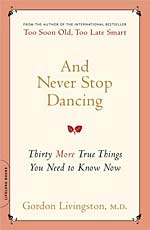"For a time after the massacre in 1999, on a hill overlooking Columbine High School, stood fifteen crosses, memorials to both the victims and the perpetrators. Then the father and stepfather of one of the dead children removed the two crosses bearing the names of the shooters. They questioned the propriety of honoring murderers in the same place as their victims.
"And so, while we were still struggling with the meaning, if any, of this tragedy, we were confronted with the question of what attitude we should take toward it. After the funerals and the ceremonies of remembrance, these events, like the sea of flowers placed near the school, began to fade. Our designated commentators turned elsewhere for opinion fodder, and the story of how two suburban boys chose to celebrate Hitler's birthday became a part of the river of events that flows by us and is lost to the memory of all but the families of the dead. Only the bereaved can understand what it is like to live in a world that does not notice their permanently unhealed wounds. If we are destined to forget, we might at least consider the possibility of forgiveness.
"We are not a very forgiving nation. Much of our law, which is to say our principal attempt at justice, is based on the concept of retribution. The idea of getting even, when that is clearly not possible, is deeply imbedded in the culture. To cite only two examples: 74 percent of Americans favor the death penalty, and we live in the most litigious society in the world. No mistake involving injury to others, real or imagined, is tolerated. Victimization and blaming are national pastimes.
"In this atmosphere, it is not surprising that forgiveness is unfashionable. One definition of the word is 'giving up a grievance to which you are entitled.' Widely confused with forgetting or reconciliation, it is neither. Forgiveness is an act of letting go, of relinquishment. It is not something we do for others; it is a gift to ourselves. The shooters at Columbine High inflicted the death penalty on themselves. What is left for us to do to them? We do not release them from accountability by forgiving; we free ourselves from the burden of bitterness. In this sense forgiveness is a selfish rather than an altruistic act.
"People present themselves for psychotherapy burdened by grievances. Abusive childhoods, alcoholic parents, bad marriages — misfortunes of every type — are offered as 'explanations' for one's current mood or behavior. The disadvantage of these formulations is that, though we have all been shaped to some extent by our past, none of us has the power to change what has happened. To relinquish the hold that the past has on us requires a conscious choice and, paradoxically, requires no strength, only courage. It necessarily involves forgiveness, not just of those who have hurt us, but also of ourselves, for the myriad mistakes, shortcomings, and wasted opportunities that mark our lives."
